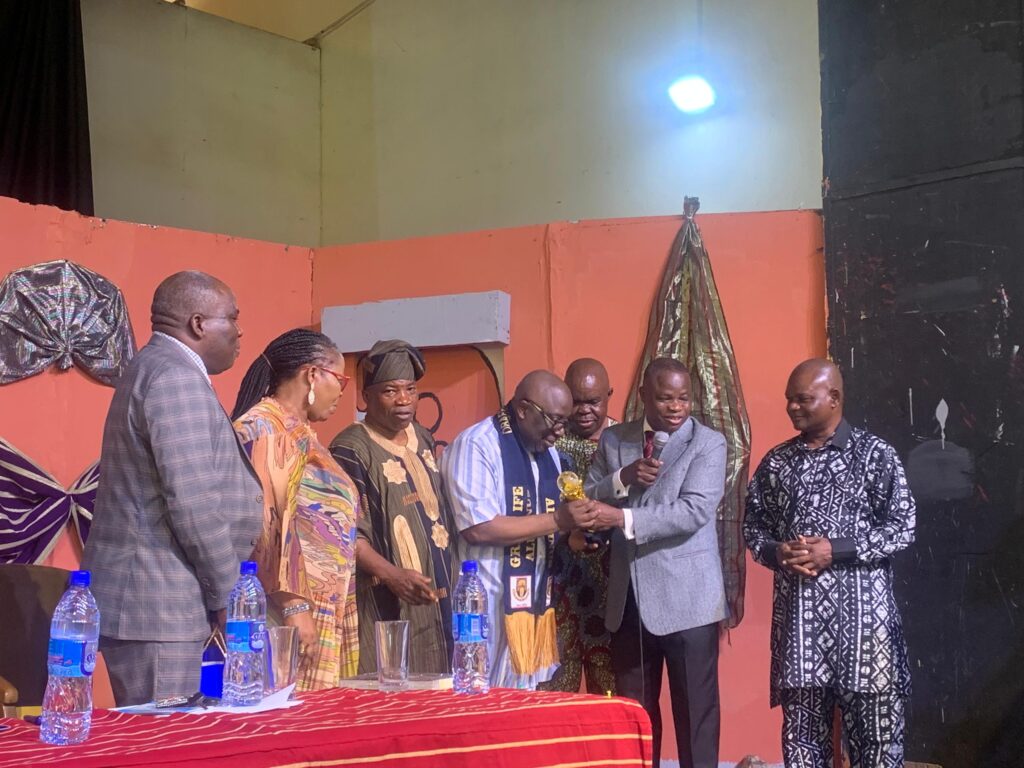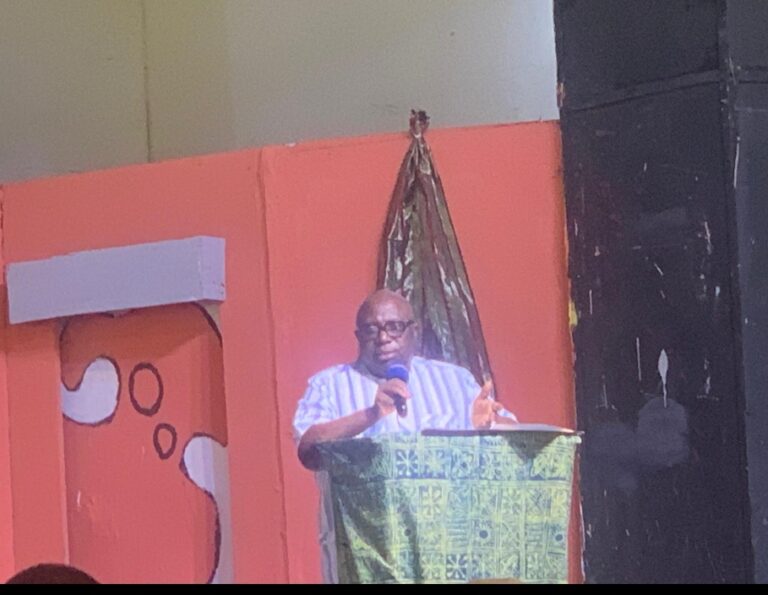By Adedoyin Oguntade & Sulaimon Olabisi
The publisher of Premium Times and distinguished alumnus of Obafemi Awolowo University (OAU), Dapo Olorunyomi, has stressed that the relationship between media, technology, and social responsibility is crucial in shaping democracy, particularly in Nigeria.
Mr Olorunyomi made this call on Tuesday, 18 November, when delivering a lecture titled “AI, Social Media and The Reconfiguration of Democratic Power in Nigeria” in OAU. The event marked the inaugural Faculty of Arts Alumni Lecture.
He argued that while digital technologies have empowered newsrooms and civil society to expose corruption and combat disinformation and misinformation, it also poses threats to the media’s civic mission, through attention-driven advertising models that prioritise speed and sensationalism over thoughtful discourse and editorial integrity.
Recall that DevReporting reported that Mr Dapo would share insights as the keynote speaker at the lecture under the chairmanship of former General Manager of Independent Communications Ltd (ICNL), publishers of PM News and Tempo, Idowu Obasa. A chartered accountant and former Chairman of Onigbongbo Local Council Development Area (LCDA) in Lagos, Mr Obasa is an alumnus of OAU.
Media, technology and social responsibility at the core of democracy
Mr Olorunyomi asserted that AI and social media have transformed how citizens engage with public issues. “The convergence of AI and social media now functions as a new Leviathan, an emergent arena in which the age-old struggles over power, authority, knowledge, and democratic legitimacy are being renegotiated,” he stated
He asserted that technologies have empowered newsrooms and civil society, enabling investigative journalism to utilise open-source intelligence, satellite imagery, data analysis, and crowdsourced evidence to expose corruption and verify electoral claims.
“Initiatives like Premium Times, the International Centre for Investigative Reporting (ICIR), HumAngle, and Dubawa exemplify how digital tools can challenge official narratives and combat disinformation,” he said
Technology’s dual threat to democratic discourse
However, Mr Olorunyomi cautioned that the same technological advancements pose threats to the media’s civic mission.
“Today, the media, especially social media platforms, are the primary arena in which citizens encounter public issues, negotiate identities, and form opinions. Yet this arena no longer operates primarily according to the norms of slow deliberation that underpinned earlier public spheres,” Mr Olorunyomi stated.
“Contemporary media ecosystems are governed by the imperatives of speed, virality, emotional intensity, and algorithmic targeting. They reward sensationalism over nuance, reaction over reflection.”
AI and social media shape Nigerian democratic power
In his lecture, Mr Olorunyomi also discussed how AI and social media are reshaping democratic power in Nigeria, expanding visibility for new actors, intensifying manipulation, and driving institutional changes.
He said: “In Nigeria, this is evident across multiple domains. Elections are now fought not only through rallies and traditional media but through targeted messaging on WhatsApp, TikTok, Instagram, and X (formerly Twitter). Protest movements such as #EndSARS gained extraordinary momentum by leveraging digital networks, yet they also struggled with fragmentation and disinformation that spread through the same channels.”
Mr Olorunyomi noted that popular culture such as afrobeats, nollywood, comedy skits, memes travels through these networks, framing how Nigerians imagine success, identity, and belonging.
ALSO READ: AMDF unveils 2025 award finalists, set to host development journalism conference
He asserted further that these platforms do not merely reflect Nigerian society; they actively organise what becomes visible and sayable, which voices are amplified or marginalised, and which narratives of the nation gain traction.
“The struggle for democratic power is therefore also a struggle for meaning within networked architectures,” he noted.
Call for collaborative action to reclaim digital tools
Mr Olorunyomi stressed that ultimately, AI and social media are transforming the conditions under which knowledge and political action are formed in Nigeria.
The survival of democracy, according to him, relies on creating spaces for collective deliberation and defending narrative sovereignty against manipulation.
He called for a collaborative effort involving journalists, educators, activists, and policymakers to ensure that technology serves human dignity and fosters critical digital literacy, rather than undermining it. “Reclaiming these tools as instruments of agency is crucial for the future of democracy in Nigeria,” he said
OAU’s culture of critical inquiry and activism
Mr Olorunyomi described the intellectual culture of Obafemi Awolowo University as one characterised by scepticism, debate, and student activism.
For alumni, he noted, the university represents a community that values scholarship, character, community spirit, and leadership. He added that this heritage serves as a foundation for examining the impact of AI and social media on democratic power.
Obasa announces seed fund for sustainable programme
The chairman of the event, Mr Obasa, noted that he was honoured to have been invited to the lecture, even though he is not an alumnus of the Faculty of Arts. He graduated from the Economics Department in 1980.
“Of the four universities I have attended, Ife (now OAU) has had the greatest impact on me,” Mr Obasa said, elaborating that Ife is a place where one gets radicalised. “I am proud and happy that I am here.”
He kickstarted the sustainable programme of the series, stating that structures, processes, and procedures are the things that change society. He announced a seed fund of N20 million for the initiative.
Award presentations

The event had in attendance the Dean of the Faculty of Arts, Gbenga Fasiku, a professor, who gave the welcome address.
Others present were the Deputy Vice-Chancellor (Academics), Ganiyu Aderonmu, a professor; Deputy Vice-Chancellor (Research and Innovations), Akanni Akinyemi, a professor and Babafemi Ojudu, a former Senator. Mr Ojudu gave out 40 copies of his latest book, “The Adventures of a Guerrilla Journalist”.
The Orogun of Òkè Ila, Oba Adedokun Abolarin; Kabiyesi Oladunjoye; Senator Ojudu; Mr Obasa, and Mr Olorunyomi were presented distinguished award at the event.

